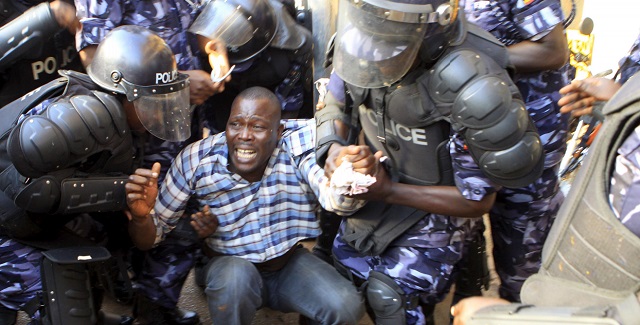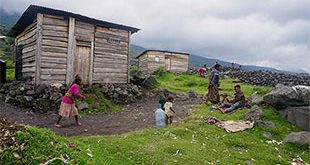
Failure of democracy
Many observers say the growing violence against the opposition in Uganda is a sign of the growing “failure of democracy in Uganda”.
According to experts on democracy, such democratic failures occur as a result of slow erosion or retrogression, often at a speed that is barely perceptible. The scholars say each small change may at first appear rational, necessary, or logical. That is why the beneficiaries often give them political consent. Until they lead to democratic erosion “when important political disputes cannot be resolved within the existing constitutional framework … (or) if important political actors no longer (believe) themselves bound by the constitutional rules.”
The small changes that are condoned, tolerated, or ignored are symptoms of the conditions, called tipping points, toward democracy erosion. The conditions, or tipping points, include conditions such rejecting or weakening the commitment to democratic rules, challenging the legitimacy of political opponents and institutions, tolerate violence, and reducing or eliminating civil liberties of opponents.
Experts group the tipping points under categories such as economic inequality, phobias (constant fear and perceived risk), and perceived threats from outsiders that play upon insecurity among the electorate. In the case of Uganda, many people interviewed about the 2021 elections say they fear the elections will be violent.
Experts in this area say countries need to establish “democratic minimum procedures” to ensure that democracy becomes or remains strong.
Conditions such as economic inequality, poverty, corruption, social inequalities, unemployment and the increasing educational gap between the wealthy and poor contribute to this as there is a link between social inequality, citizen security, and the erosion of democracy.
Such conditions may lead citizens, when given opportunity to elect populist leaders. This may explain the increasing election of comic characters into high offices in Uganda, including in parliament.
If the opportunities for such expression are blocked, such as at the level of the presidency in Uganda currently, then citizens can opt for other measures; including taking up arms as liberators. These are the conditions that drove President Museveni and others into the Luwero jungles to wage a rebel war of liberation.
At one point in 1980, although Museveni was the vice chairman of the ruling Military Commission, he was held for hours by soldiers and reportedly made to kneel at a roadblock at Kireka until his brother, Caleb Akandwanaho aka Salim Saleh and his bodyguards led by Fred Rwigyema rescued them commando-style.
Museveni’s son, Muhoozi Kainerugaba who was barely six years at the time and is now a general in the UPDF and Museveni’s wife, First Lady Janet Museveni were with Museveni when he was held in Kireka.
The incident made such a powerful mark on them that Gen. Kainerugaba narrates it in his book entitled ‘Battles of the Ugandan Resistance: A Tradition of Maneuver’. On page 80 Gen. Kainerugaba writes: “The (Oyite) Ojok faction of the UNLA had intended to murder Museveni, his wife, young son (now author) and a couple of bodyguards at this roadblock. At Kireka (an incident the author recalls vividly) an enraged and gun-toting Saleh dismounted from a speeding car in the company of Fred Rwigema, Akanga Byaruhanga, and another soldier. He proceeded to violently slap the commander of the roadblock sending him crashing to the ground) before telling the cowering man to tell his superiors that it was “Commander Salim Saleh’ that had rescued Museveni.”
First Lady Janet Museveni also writes about the incident in her biography entitled “My Life’s Journey.”
Another UPDF veteran, Gen. Pecos Kutesa narrates a similar humiliating incident which convinced him to join the army to defend himself. In his book entitled `Uganda’s Revolution 1979-1986: How I Saw It,’ Kutesa describes how he was smartly dressed and heading for a job interview when Amin soldiers forced him out of a car at an army road block and ordered him to roll in mud.
Opposition stalwart retired Col. Kizza Besigye also joined Museveni in the bush war after being humiliated by soldiers at the Imperial Hotel in Kampala.
The list goes on. And the moral is that by humiliating genuine opposition leaders like Kyagulanyi, Amuriat and others and creating fear, helplessness, and frustration among the public, the security forces could be sowing the seeds of the next “liberation” war.
FDC’s Secretary General, Nathan Nandala Mafabi says the violence witnessed on Nov. 03 presidential nomination was window-dressing for what lies ahead. It foretells the kind of elections it will be if presidential candidates are handled in such a manner.
 The Independent Uganda: You get the Truth we Pay the Price
The Independent Uganda: You get the Truth we Pay the Price



Under normal, a free society and democratic dispensation, to the citizens, the government is supposed to be the paid, respectful and loyal servant. But in our Uganda case, it is the other way round. It is the servants who beat up, starve and kill the Master.
As a result, public servants live in obscene luxury like Kings, Queens, Princes/s and/or Nobles: they are nasty, obnoxious and driven at high speed in luxury vehicles, escorted by a motorcade of sirens and armed police/military guards. Meanwhile the citizens who pay them work like slaves, sleep tired, hungry, sick and at the mercy of their Royal Servants .
And on many occasions cry out: “Gavumenti atuyambe”.
In other words, it is not only during the election cycles, but almost every day of the year; that state terrorism, intimidation and/or violence on Ugandans is by design. Otherwise, why should the Uganda Police and the military contentiously beat up and shot at Ugandans over minor infraction or rules, committed out of curiosity?
No wonder Mr. Museveni categorically said that his is nobody’s servant or employee. Meaning: he is the Master and Royal King and Ugandans are his slaves and servants.